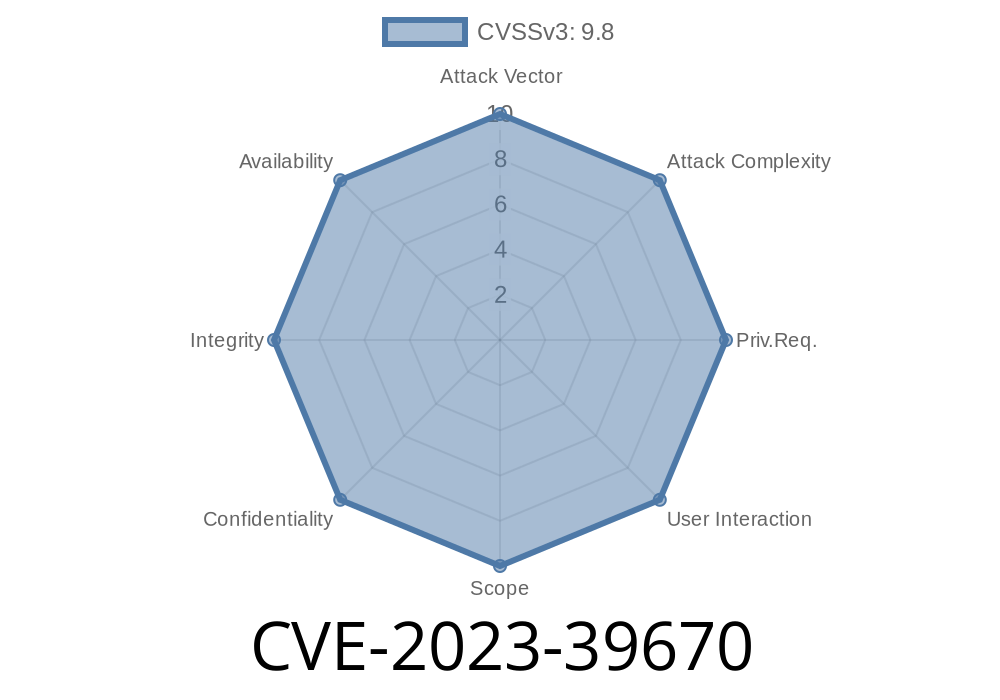The world of IoT and networking is filled with handy devices, but sometimes these tools come with vulnerabilities that can put your entire digital life at risk. One such issue, tracked as CVE-2023-39670, affects the *Tenda AC6* wireless router. In this deep dive, let's break down what the vulnerability is, how it can be exploited, and what it means for everyday users and researchers.
What is CVE-2023-39670?
CVE-2023-39670 refers to a buffer overflow vulnerability discovered in the Tenda AC6 WiFi router running firmware Version _US_AC6V1.BR_V15.03.05.16. The weakness arises specifically in how the router uses the fgets function, allowing an attacker to overflow a memory buffer, potentially leading to code execution or a device crash.
How does the Buffer Overflow Happen?
In programming, a buffer overflow occurs when data exceeds the allocated space in memory, potentially overwriting/corrupting data or allowing an attacker to inject malicious code.
In the affected Tenda AC6 firmware, the problem lies in a function that reads user-provided input using fgets without properly verifying the input size. If a user sends more data than expected, it overflows the buffer.
To illustrate, here's a simplified version of the problematic code pattern
void vulnerable_function(FILE *fp) {
char buf[64]; // Allocates a buffer of 64 bytes
fgets(buf, 128, fp); // Reads up to 128 bytes - BUFFER OVERFLOW!
// ... do something with buf ...
}
char buf[64]; only has space for 64 bytes.
- fgets(buf, 128, fp); will read up to 128 bytes from input, easily overwriting the buffer and leading to a classic buffer overflow scenario.
Exploitation: Step-by-step
Now, let's talk about how this vulnerability can be exploited.
Requirements
- Access (local or remote, possibly via network or web interface) to the router’s service that calls this vulnerable function.
Identify the Input Field:
Locate the web form, configuration field, or network service that passes user-controlled data to the vulnerable fgets call.
Craft the Malicious Payload:
Create input that exceeds 64 bytes. The payload often includes "NOP sleds" followed by shellcode or specific data to overwrite saved return addresses.
Denial of Service: The router may crash, causing a network outage.
- Remote Code Execution: With skill, custom payloads can give the attacker full control—injecting malware, intercepting traffic, or joining the device to a botnet.
Responsible Disclosure & References
This vulnerability was originally detailed by security researchers and assigned the identifier CVE-2023-39670. For more deep technical insights or to review official notices, check out:
- NVD Entry for CVE-2023-39670
- Exploit Database (if/when available)
- Tenda Official Site (Firmware Updates & Advisories)
Mitigation & Recommendations
- Update Firmware: Always install the latest firmware for your Tenda AC6. Patches closing this loophole may already be released.
Conclusion
Buffer overflow bugs like CVE-2023-39670 highlight the hidden dangers in everyday hardware. If you use a Tenda AC6 router, be sure to update your firmware and stick to safe networking practices. For researchers and tinkerers, understanding these vulnerabilities helps us all build a safer Internet.
Timeline
Published on: 08/18/2023 03:15:22 UTC
Last modified on: 08/23/2023 19:13:26 UTC
